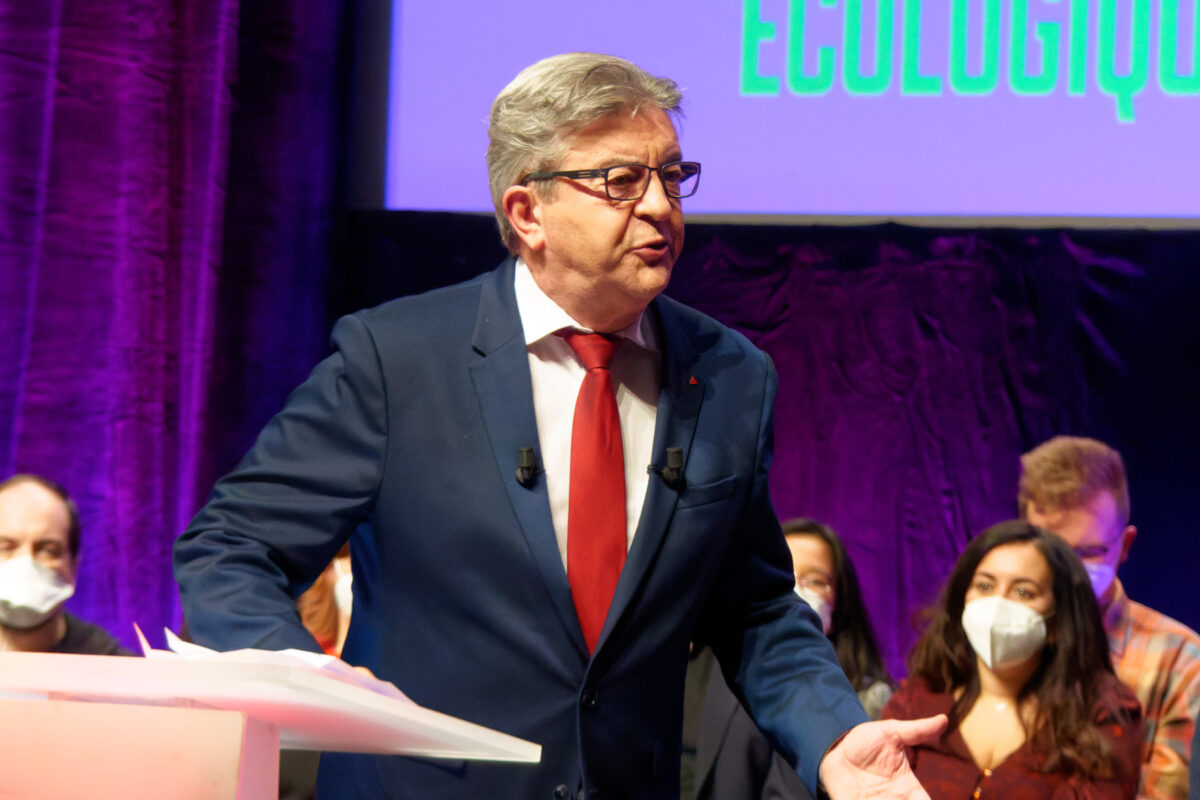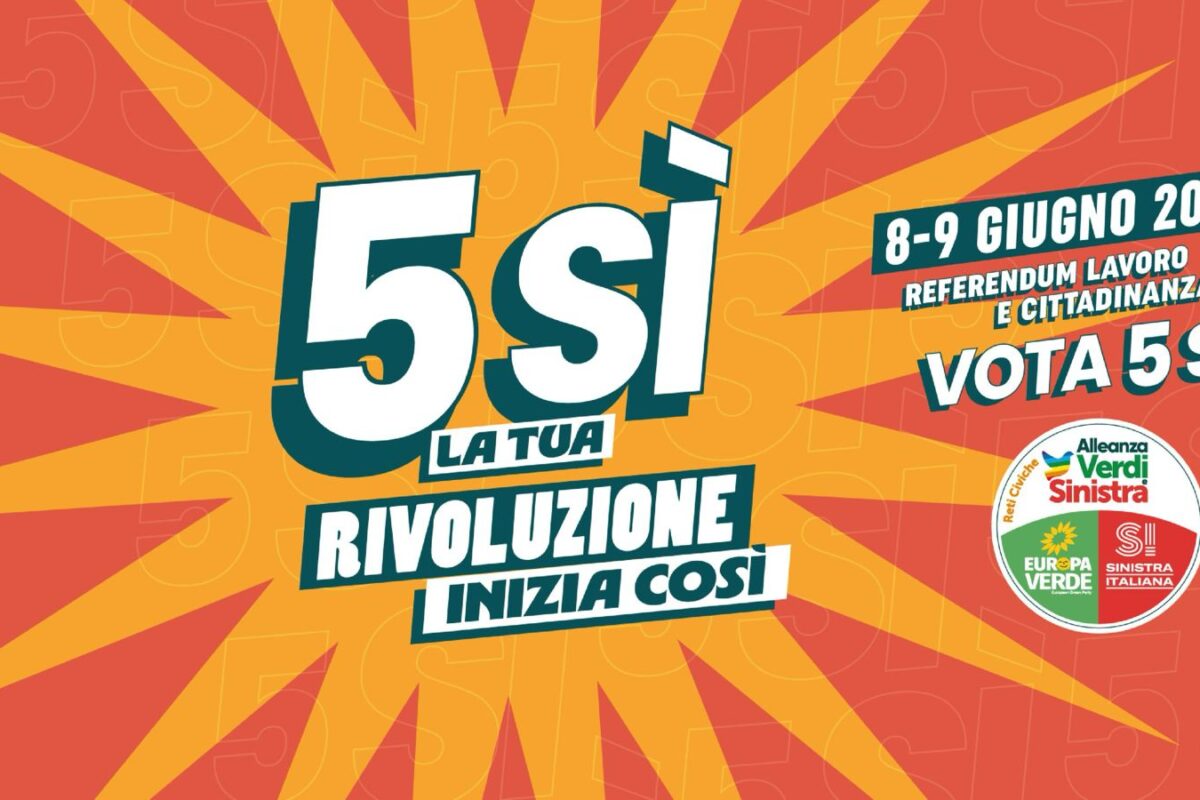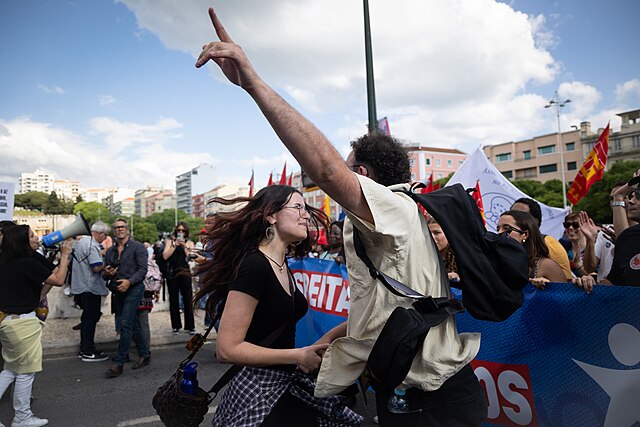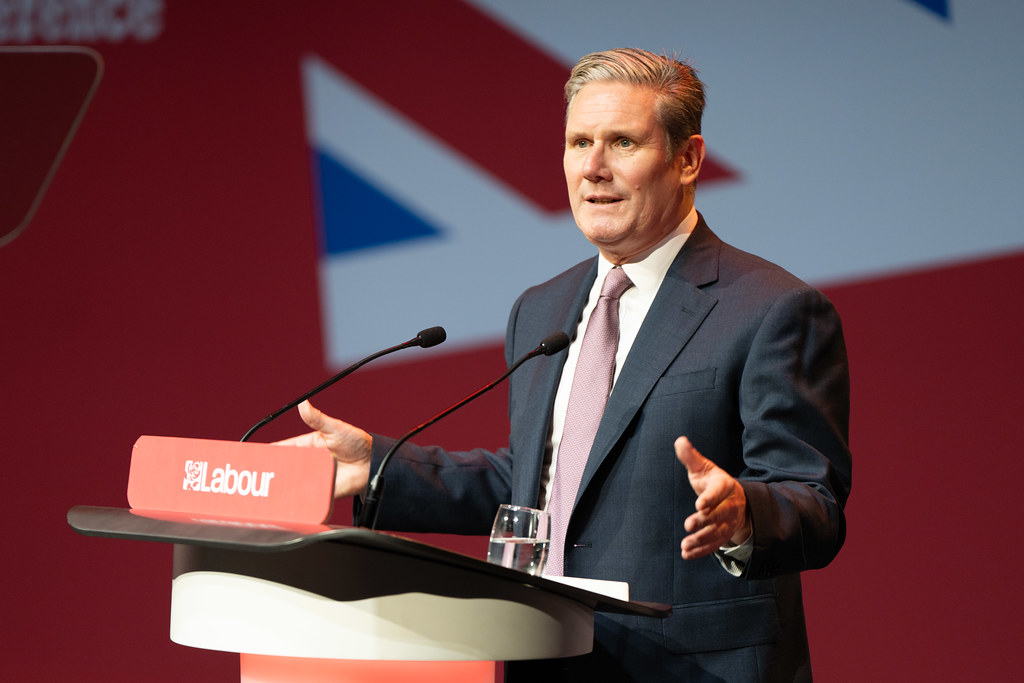The French presidential elections take place in April 2022. With two far-right candidates, and with Macron playing a strong hand, there is plenty of bad news, but there is a hopeful side too. This article (part one) will look at the usefulness for working people of Jean-Luc Mélenchon’s campaign and organization. Part two will look at his left patriotism, foreign policy, and at some major disagreements of Marxists with his strategy.
Mélenchon got seven million votes (19.5%) in the first round of the French presidential elections in 2017, the biggest radical left vote in France since 1945. France Insoumise (FI) votes were particularly common among blue-collar voters (24%), low-paid white-collar voters (22%) and among 18-24 year-olds (30%). At present, at over 11% in the polls, Mélenchon has at least three times the support of the Socialist Party, which held the presidency till 2017, and no other left candidate comes near. In the last elections, 21.4% was enough to get through to the second round. Fewer may be sufficient this time, and Mélenchon’s team is hoping to mobilize those working-class voters who usually stay home, to create a surprise on election day.
Mélenchon’s pitch and his programme [1]
The fact that, after five years of Macron, the 500 richest families in France have doubled their wealth, while the number of children living in poverty has risen by 40%, along with the remarkable combativity and class consciousness of French workers in recent years, guarantees that there is plenty of space for the radical left. Mélenchon and his team believe it is possible to bring about a “citizens’ revolution” to usher in “the epoch of the people”, to quote the titles of two of his many writings [L’ère du peuple, Paris, Fayard, 2014].
It is hardly surprising that so many are inspired and encouraged. The FI programme proposes dozens of measures to radically reverse the trend of wealth being siphoned off ever more by the 1%. It proposes to freeze prices on a series of basic necessities and to develop a policy of a basic quantity of free electricity and water for every household. A sharp rise in the minimum wage and of minimum pension rates is promised, while the laws passed by Macron and Hollande which restricted workers’ rights to organize and to have stable contracts, are to be repealed. The programme plans a completely free health service (at present most people take out complementary insurance). It also promises retirement at 60 and a shorter working week.
The vision put forward is one that takes full account of the urgency of climate deterioration: policies include the end of nuclear power before 2030, a move to 100% renewable energy, and the creation of a million and a half climate jobs. The intention is to set up massive support for organic agriculture, creating 300,000 jobs and moving quickly to 100% organic farming.
The programme reacts to recent movements by reserving a billion euros for the fight against sexist violence. And, after the recent scandal of large-scale mistreatment of elderly people in the Orpea chain of private retirement homes (1,100 homes across France), an FI government would only allow retirement homes to be run by non-profit organizations or by local governments.
A determined effort is planned to tax the rich more and stop the use of tax havens. On inheritance tax, Mélenchon’s programme would impose a twelve million euro maximum. Anything more than that would go into the public coffers (and, calculations show, could pay for student grants for all). For the rest of us, up to 120,000 euros of inheritance would be completely tax-free.
Finally, the France Insoumise [2] wants to change the constitution and sharply reduce the power of the president, moving to a sixth Republic (the Fifth was established in 1958). If Mélenchon were to be elected, he would call a constituent assembly to rewrite the constitution.
In a world where austerity, privatization and individualism are sold to us as inevitable, it is a breath of fresh air to watch Mélenchon and FI members of parliament on television defending these reforms. And the reforms are popular. Early February, the manifesto was number six in the list of best-selling books in France, and the YouTube channel had 700,000 subscribers. A recent opinion poll [Harris, August 2021] showed that 88% of people approved of a sharp rise in the minimum wage, and 90% agreed retirement pensions should never be below the minimum wage. Eighty per cent said enough water for basic needs should be free and 86% are in favour of aiming towards 100% renewable energy, while 63% want a change in the constitution and the establishment of a sixth republic.
In addition to its radicality, the FI campaign has an insurgent tone, which drew millions of voters in 2017 who had previously stayed home at election time. Mélenchon quotes the great French writer Victor Hugo, saying “From now on, this word ‘Revolution’ will be the name of civilization, until it is replaced by the word ‘harmony’”. He likes to repeat in meetings that great left slogan “Ecology without class struggle is just gardening really”. And he insists that “the only thing that can limit exploitation is resistance to exploitation”.
Islamophobia
Like the rest of the radical and revolutionary left in France, the France Insoumise does not sufficiently mobilize a fight against islamophobia. Macron’s dissolution of groups that assisted victims of islamophobia was greeted only by angry press releases by the whole of the left. However, Mélenchon’s recent positions, with encouragement from anti-racist groups based in multi-ethnic, working class neighbourhoods, represent a historic shift in France on the question, as the islamophobic consensus on the left is now thoroughly broken. Fascist candidate Eric Zemmour accuses Mélenchon of “lying down passively before the Imam”, and he is regularly attacked for being “soft on Islamic fundamentalism”.
In December 2019 there was the first ever mass demonstration specifically against islamophobia in Paris. Mélenchon was there (whereas the Socialist Party refused to support). Unlike some, Mélenchon refuses to apologize for having been at the demo. This demonstration caused some dissensions within the Communist Party, and within the France Insoumise, with one of their MPs, François Ruffin, famously commenting that he wasn’t going to this demonstration “because I have football on Sundays”.
Since then, Mélenchon’s defence of Muslims against racism has only become louder, clearer, and more systematic. The FI group was the only parliamentary group to vote against the islamophobic laws – supposedly against “Muslim separatism”– pushed through by Macron last year. Mélenchon declared that “separatism” was “ a stupid concept” invented “in order to stigmatize Muslims”. He now regularly reminds his mass audiences that “hatred for Muslims is a central factor of division allowing the powerful to remain powerful”.[3]
It is not an accident that some influential Black anti-racist groups are calling to vote for him, when they are often uninterested in “white politics”. One explained it was because Mélenchon “had broken with the Islamophobic consensus” and because he defends “the creolization of society” (a term Mélenchon has often used) and explicitly rejects a White identity for France.
Usefulness in struggle
The fight against the power of capital has always had three main aspects: [4] Firstly, the concrete fight – gaining wage increases, union rights or permanent contracts; secondly, the political fight – pushing through laws that help our class (whether it be bigger health budgets or gay marriage) and finally the ideological fight, to push back the idea that “There is No Alternative” to vicious austerity and militarism, and to push forward the idea that capitalism can be overthrown, and explain how this might be done. How useful in these struggles is the FI?
If Mélenchon gets a strong vote in the first round, every concrete struggle will be encouraged. If he should get to the second round (and the large number of candidates means this is not impossible) it will be a political earthquake. Already in 2022, solid railway strikes and education strikes for pay have shown that a fightback is coming – a large radical left vote will help this along.
The France Insoumise has at present 17 MPs elected to the National Assembly, including a call-centre operator, Adrien Quatennens; a librarian, Danièle Obono; and a nursing assistant, Caroline Fiat. They have carried out intensive parliamentary work since 2017, occasionally managing to push through an amendment in the interests of the 99%, but more often proposing bills or amendments that are voted down, but that nevertheless allow a debate in parliament and in the media on a wide range of social questions. On the question of police racism, for example, the FI proposed an amendment that would oblige all police officers who checked someone’s ID to give a certificate to the person concerned. This would improve the situation in particular of Black and Arab men, by making repeated checks several times a day impossible. The FI MPs have stood out in their denunciation of police violence.
The vocal FI support in parliament and in the media for the successful campaign in 2019-2021 to push back Macron’s plan to smash pensions was certainly useful, as was the support for the Yellow Vests. The MPs organized a minute of silence during a parliamentary debate for the Yellow Vests killed and injured during the movement “because of their commitment to be citizens”.
FI MPs know how to attract the media. A couple of years back, when one of Macron’s ministers mocked those protesting at a cut of “only five euros” in Housing Benefit, France Insoumise MPs upset the government by coming into parliament with some shopping, to teach the minister what you can buy with five euros when you are poor. Last week, François Ruffin brandished a huge cheque for many billions of euros in parliament, symbolizing the money given by Macron to big business during his presidency.
On the key question of antifascism, Mélenchon is the one who had the courage to stand directly against Marine Le Pen in her own constituency in 2012, and the FI were central to the organization of last year’s rare mass demonstration against fascism. Meanwhile, one FI MP, François Ruffin, is responsible for the two best mass-distributed political documentaries in the last 30 years: “Je veux du soleil” (2019) [5] about the Yellow Vest revolt, and “Debout les femmes” (2021) on the work and struggles of women cleaners and care assistants.
The France Insoumise sees the presidential campaign as a time of crucial political education and debate (two and a half hour political interviews on prime-time TV is the way we do things here!). [6] Three of Mélenchon’s recent long TV interviews received more than 1.5 million visits on the FI YouTube channel. He is an extraordinarily good speaker. His February meeting at Montpellier, entitled “The rich are idlers” got an audience of 8 000 people, and 300 000 YouTube visits. For the political struggle of our class, the France Insoumise is doing its bit.
Libel and slander
Naturally, Mélenchon is the target of impressive smear campaigns, which have loudly trumpeted that he is a megalomaniac, a racist, an Islamist, an antisemite and, most recently, a friend of Putin’s. These smears usually come from the Right, the Socialist Party, the Greens or the mass media, but are occasionally taken up by people on the far left. [7] The smear campaigns run in the usual manner, with Socialist Party press releases saying “He’s a friend of Putin’s”, soft left papers saying “It is widely believed he is a friend of Putin’s”, and many foolish people vaguely on the left chipping in helpfully with “Can you prove he isn’t a little pro-Putin on Tuesdays?” There are not enough people on the left who understand that any section of the left must be fiercely defended against smear campaigns by the whole of the left. The Corbyn experience in Britain shows how crucial this is.
The aim of this first part has been to explain the importance of the exciting left election campaign of the France Insoumise, which is generally underplayed on the international left. In part two, I will look at Mélenchon’s vision of foreign policy, of left patriotism, and some other places where Marxists have important disagreements with him.
John Mullen is a Marxist activist in the Paris region, and a supporter of the France Insoumise. His political website is here.
Footnotes
1 You can find online, in English, the Table of Contents of the 2017 version of the programme, which gives an impression of its nature and tone.
2 For reasons which have mostly to do with how the French language works, the best translation of “La France Insoumise” is “France in revolt” not “France unbowed”. Firstly, “soumis” and “insoumis” are relatively everyday words in French, whereas “bowed” and “unbowed” are not, in English. More importantly, “France unbowed” suggests the whole of France is referred to, whereas “la France Insoumise” can refer to that part of the French nation which is in revolt. This is why you can see terms such as “La France vaccinée”… ( word for word “vaccinated France”…) to speak of that section of French people who are vaccinated, or “La France syndiquée” (“unionized France”) to speak of those in France who are members of trade unions.
3 This particular quote is from this lecture : 1981, la révolution suspendue – Conférence sur la victoire de François Mitterrand.
4 These were mentioned by Marx as early as 1850.
5 At least 200,000 people saw it in French cinemas.
7 Leading member of the New Anticapitalist Party, Olivier Besancenot, in this interview for example.




